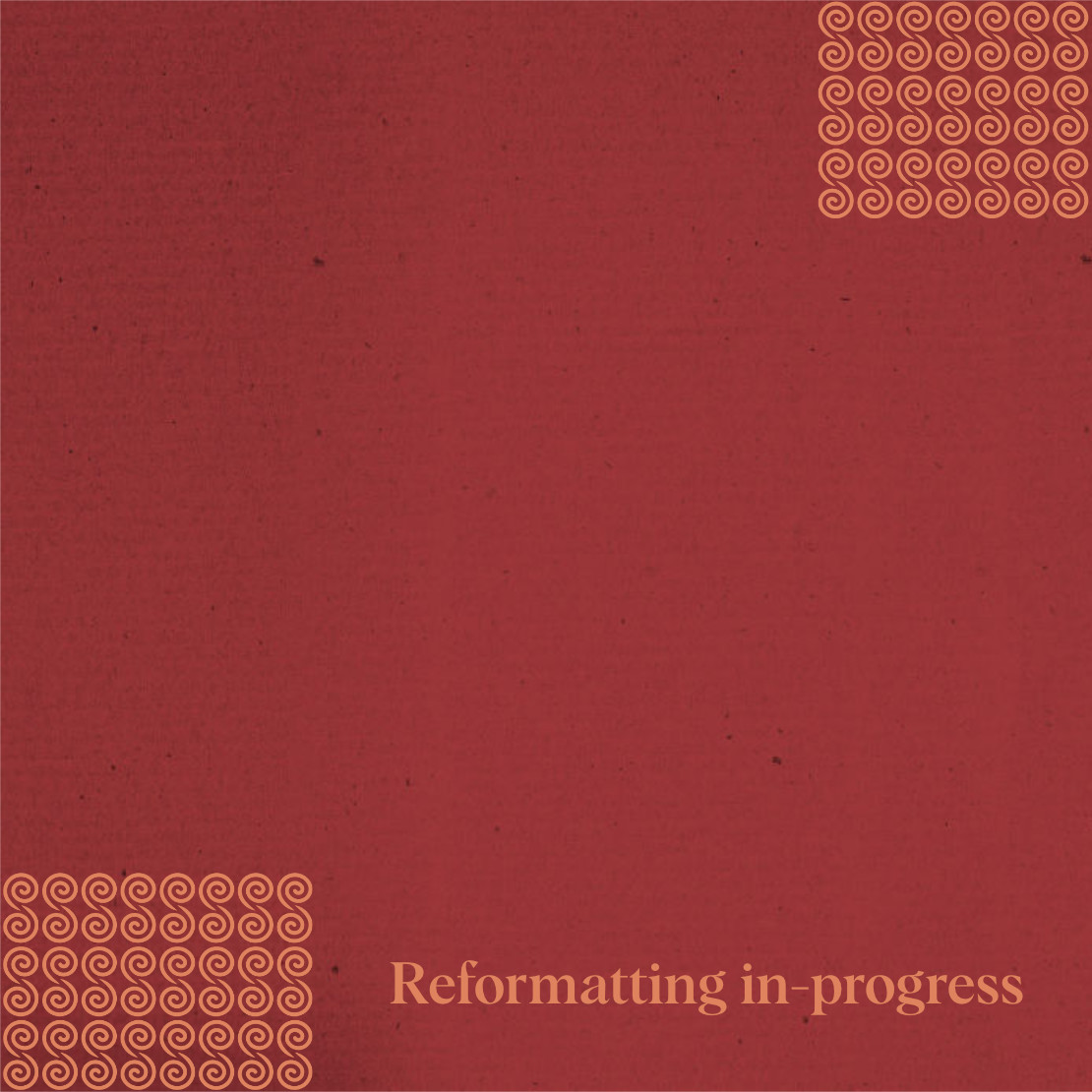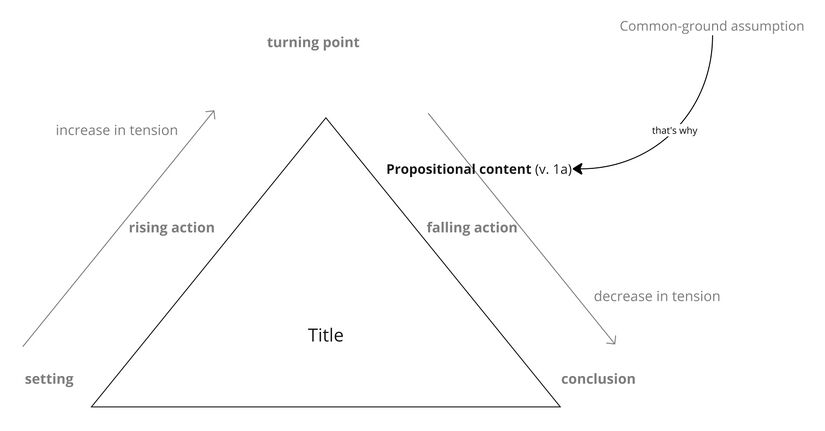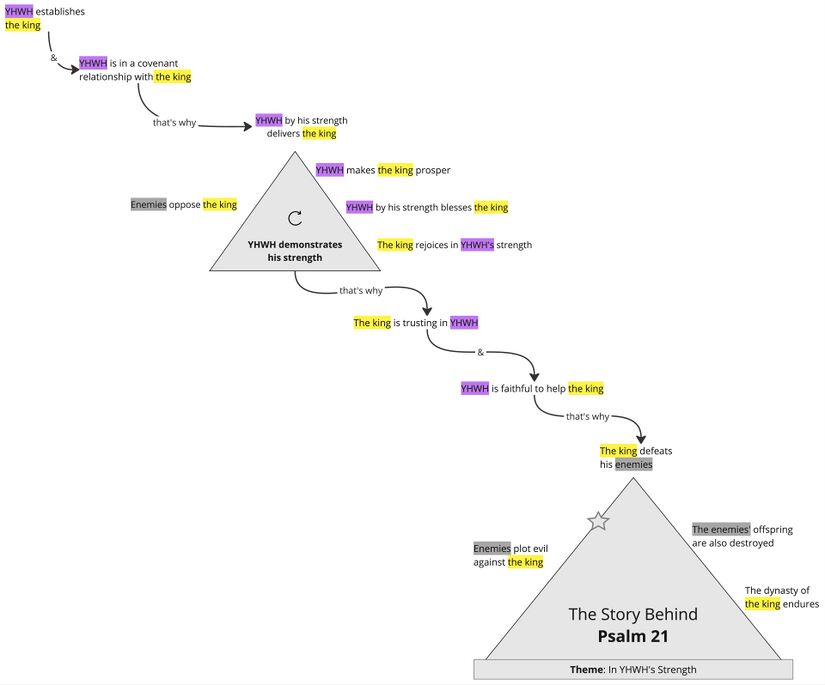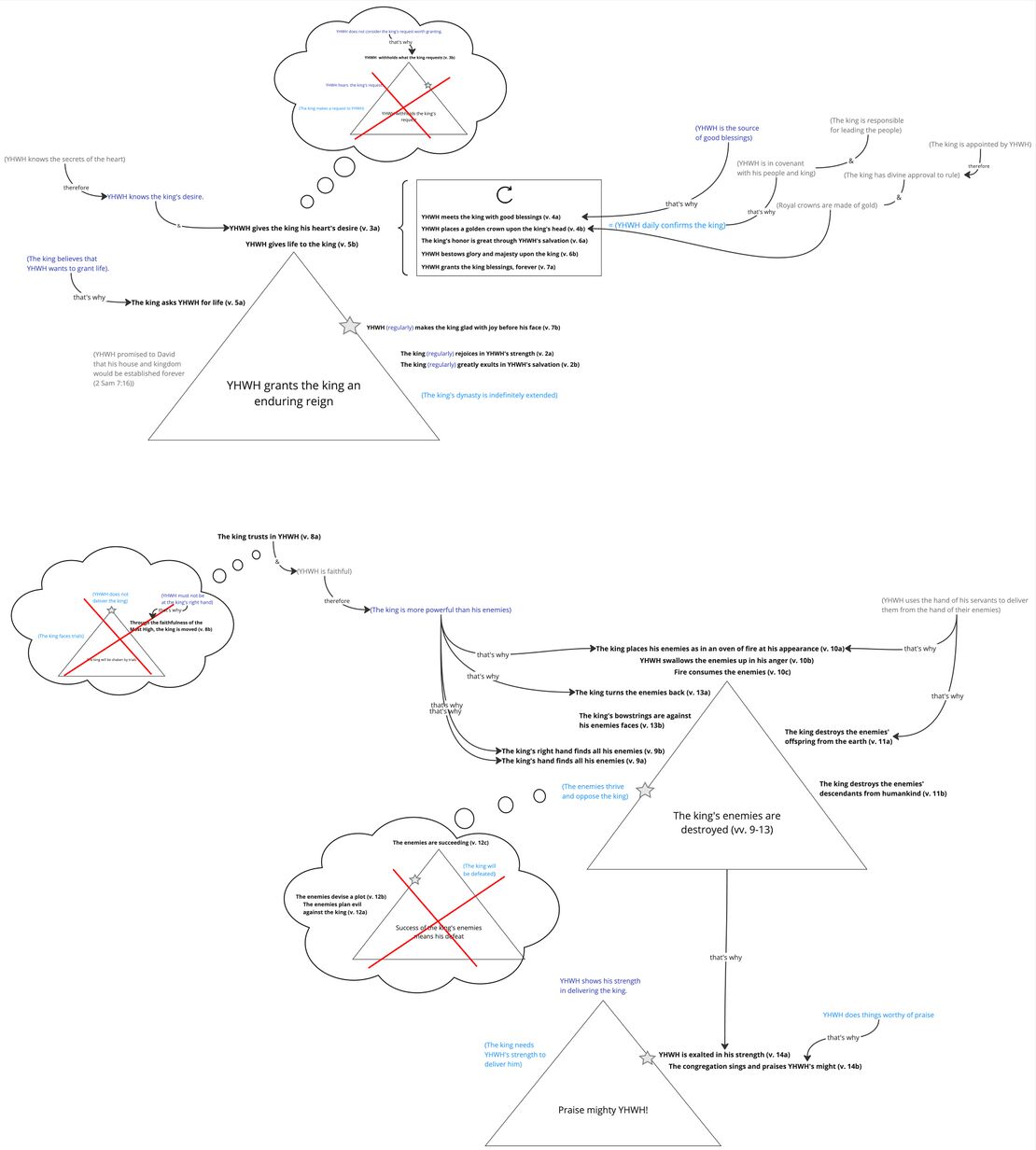Psalm 21 Story Behind
Guardian: Ben
About the Story Behind Layer
The Story Behind the Psalm shows how each part of the psalm fits together into a single coherent whole. Whereas most semantic analysis focuses on discrete parts of a text such as the meaning of a word or phrase, Story Behind the Psalm considers the meaning of larger units of discourse, including the entire psalm.
The goal of this layer is to reconstruct and visualize a mental representation of the text as the earliest hearers/readers might have conceptualized it. We start by identifying the propositional content of each clause in the psalm, and then we identify relevant assumptions implied by each of the propositions. During this process, we also identify and analyze metaphorical language (“imagery”). Finally, we try to see how all of the propositions and assumptions fit together to form a coherent mental representation. The main tool we use for structuring the propositions and assumptions is a story triangle, which visualizes the rise and fall of tension within a semantic unit. Although story triangles are traditionally used to analyze stories in the literary sense of the word, we use them at this layer to analyze “stories” in the cognitive sense of the word—i.e., a story as a sequence of propositions and assumptions that has tension.
Summary Triangle
The story triangle below summarises the story of the whole psalm. We use the same colour scheme as in Participant Analysis. The star icon along the edge of the story-triangle indicates the point of the story in which the psalm itself (as a speech event) takes place. We also include a theme at the bottom of the story. The theme is the main message conveyed by the story-behind.
| Story Triangles legend | |
|---|---|
| Propositional content (verse number) | Propositional content, the base meaning of the clause, is indicated by bold black text. The verse number immediately follows the correlating proposition in black text inside parentheses. |
| Common-ground assumption | Common-ground assumptions[1] are indicated by gray text. |
| Local-ground assumption | Local-ground assumptions[2] are indicated by dark blue text. |
| Playground assumption | Playground assumptions[3] are indicated by light blue text. |
| The point of the story at which the psalm takes place (as a speech event) is indicated by a gray star. | |
| If applicable, the point of the story at which the psalm BEGINS to take place (as a speech event) is indicated with a light gray star. A gray arrow will travel from this star to the point at which the psalm ends, indicated by the darker gray star. | |
| A story that repeats is indicated by a circular arrow. This indicates a sequence of either habitual or iterative events. | |
| A story or event that does not happen or the psalmist does not wish to happen is indicated with a red X over the story triangle. | |
| Connections between propositions and/or assumptions are indicated by black arrows with small text indicating how the ideas are connected. | |
| Note: In the Summary triangle, highlight color scheme follows the colors of participant analysis. | |
Background ideas
Following are the common-ground assumptionsCommon-ground assumptions include information shared by the speaker and hearers. In our analysis, we mainly use this category for Biblical/Ancient Near Eastern background. which are the most helpful for making sense of the psalm.
- YHWH placing the crown upon the king’s head shows that he has divine approval and is YHWH's representative who has been installed to lead and protect his people (Craigie 2004:191; cf. Ryken 2000:185).
- YHWH's presence (or face) is a source of joy to those in his favour (Ps 16:11). "The presence of God is the central promise of the Abrahamic covenant (Ge 17:7–8), of the Mosaic covenant (Ex 25:8; cf. Ge 9:27), and of the Davidic covenant (2 Sa 7:9, 14)" (VanGemeren 2008:231).
- YHWH promised through covenant with David that his house and kingdom would be established with an enduring legacy (2 Sam 7:16; Ps 61:5–7).
- The arm is a symbol of strength (Job 35:9, Ps 18:35, Is 52:10). The right side represents strength (Ps 20:6, 78:54), authority (Gen 48:14), and support (Lam 2:3). YHWH does wonderous things by his right arm (Ps 115:15; Ex 15:6), but also uses the hand of his servants to deliver his people (2 Sa 3:18b).
Background situation
The background situation is the series of events leading up to the time in which the psalm is spoken. These are taken from the story triangle – whatever lies to the left of the star icon.

Expanded Paraphrase
The expanded paraphrase seeks to capture the implicit information within the text and make it explicit for readers today. It is based on the CBC translation and uses italic text to provide the most salient background information, presuppositions, entailments, and inferences.
| Expanded paraphrase legend | |
|---|---|
| Close but Clear (CBC) translation | The CBC, our close but clear translation of the Hebrew, is represented in bold text. |
| Assumptions | Assumptions which provide background information, presuppositions, entailments, and inferences are represented in italics. |
| Text (Hebrew) | Verse | Expanded Paraphrase |
|---|---|---|
| לַמְנַצֵּ֗חַ מִזְמ֥וֹר לְדָוִֽד׃ | 1 | For the director. A psalm of David. |
| יְֽהוָ֗ה בְּעָזְּךָ֥ יִשְׂמַח־מֶ֑לֶךְ וּ֝בִישׁ֥וּעָתְךָ֗ מַה־יָגֵיל מְאֹֽד׃ | 2 | YHWH, the king who is in covenant with you and responsible for leading your people rejoices because of your strength which has established him as king, and causes him to prosper and how greatly he exults because of your salvation from those who oppose him. |
| תַּאֲוַ֣ת לִ֭בּוֹ נָתַ֣תָּה לּ֑וֹ וַאֲרֶ֥שֶׁת שְׂ֝פָתָ֗יו בַּל־מָנַ֥עְתָּ סֶּֽלָה׃ | 3 | The king desired that his life be extended and You have granted it to him because you know the secrets of the heart and therefore you knew his heart’s desire and considered it worth granting so that now his life and righteous reign is extended, and when the king made the request you heard it, and so you have not withheld his lips’ request. Selah. |
| כִּֽי־תְ֭קַדְּמֶנּוּ בִּרְכ֣וֹת ט֑וֹב | 4 | For those opposed to the king have met him with evil intentions but because of your covenant relationship with the king you meet him with good blessings which can only be found in you; The king has your divine approval to rule and so You place a golden crown upon his head such that he is now established as king. |
| חַיִּ֤ים ׀ שָׁאַ֣ל מִ֭מְּךָ נָתַ֣תָּה לּ֑וֹ אֹ֥רֶךְ יָ֝מִ֗ים עוֹלָ֥ם וָעֶֽד׃ | 5 | He faces opposition and for many kings opposition means a short reign but you are the source of life which is why He asked for life from you; and you are the saving refuge of your anointed, and so you have granted it to him; so that he has a Long life, and his dynasty extends forever and ever just as you promised David it would. |
| גָּד֣וֹל כְּ֭בוֹדוֹ בִּישׁוּעָתֶ֑ךָ ה֥וֹד וְ֝הָדָר תְּשַׁוֶּ֥ה עָלָֽיו׃ | 6 | His honor is made great because of your salvation from opposition; You bestow glory and majesty upon him. |
| תְּחַדֵּ֥הוּ בְ֝שִׂמְחָ֗ה אֶת־פָּנֶֽיךָ׃ | 7 | For the king finds favor with you and so you give him blessings forever; The king did not have joy before, but now the king is in your presence and your presence is a source of joy to those who are in your favor which is why You make him glad with joy with your presence. |
| כִּֽי־הַ֭מֶּלֶךְ בֹּטֵ֣חַ בַּיהוָ֑ה | 8 | For YHWH is abounding in steadfast love and faithfulness which is why the king trusts in YHWH, and because of the faithfulness of the Most High who has proven faithful to the king previously, he will not be shaken. |
| תִּמְצָ֣א יָ֭דְךָ לְכָל־אֹיְבֶ֑יךָ יְ֝מִֽינְךָ תִּמְצָ֥א שֹׂנְאֶֽיךָ׃ | 9 | Because YHWH is on your side Your hand will be more powerful than that of your enemies and in searching them out you will reach to all your enemies; likewise Your right hand will lay hold of those who hate you. |
| תְּשִׁיתֵ֤מוֹ ׀ כְּתַנּ֥וּר אֵשׁ֮ לְעֵ֪ת פָּ֫נֶ֥יךָ | 10 | The enemies thrive and oppose the king which is why YHWH will use you, his servant and You will place them as [in] a fiery oven at the time of your appearance; then YHWH himself will swallow them up in his anger, and fire will consume them. |
| פִּ֭רְיָמוֹ מֵאֶ֣רֶץ תְּאַבֵּ֑ד | 11 | You will even find the enemies' posterity, that is destroy their offspring from the earth, and their descendants from humankind. |
| כִּי־נָט֣וּ עָלֶ֣יךָ רָעָ֑ה | 12 | Because even if they planned evil against you [and] they devised a plot, hoping for your defeat they would not succeed. |
| כִּ֭י תְּשִׁיתֵ֣מוֹ שֶׁ֑כֶם | 13 | Although the enemy confronts you and your army they will be defeated Because you will make them turn back, With your army readied with their bowstrings you will take aim at their faces and you will be victorious. |
| ר֣וּמָה יְהוָ֣ה בְּעֻזֶּ֑ךָ | 14 | YHWH, the king has needed your strength, so be exalted in your strength which you have shown in delivering him because your strength is cause for exaltation! And Let us sing about and praise your might because you have done things worthy of praise! |
There are currently no Imagery Tables available for this psalm.
Bibliography
Footnotes
- ↑ Common-ground assumptions include information shared by the speaker and hearers. In our analysis, we mainly use this category for Biblical/ANE background - beliefs and practices that were widespread at this time and place. This is the background information necessary for understanding propositions that do not readily make sense to those who are so far removed from the culture in which the proposition was originally expressed.
- ↑ Local-ground assumptions are those propositions which are necessarily true if the text is true. They include both presuppositions and entailments. Presuppositions are those implicit propositions which are assumed to be true by an explicit proposition. Entailments are those propositions which are necessarily true if a proposition is true.
- ↑ Whereas local-ground assumptions are inferences which are necessarily true if the text is true, play-ground assumptions are those inferences which might be true if the text is true.








